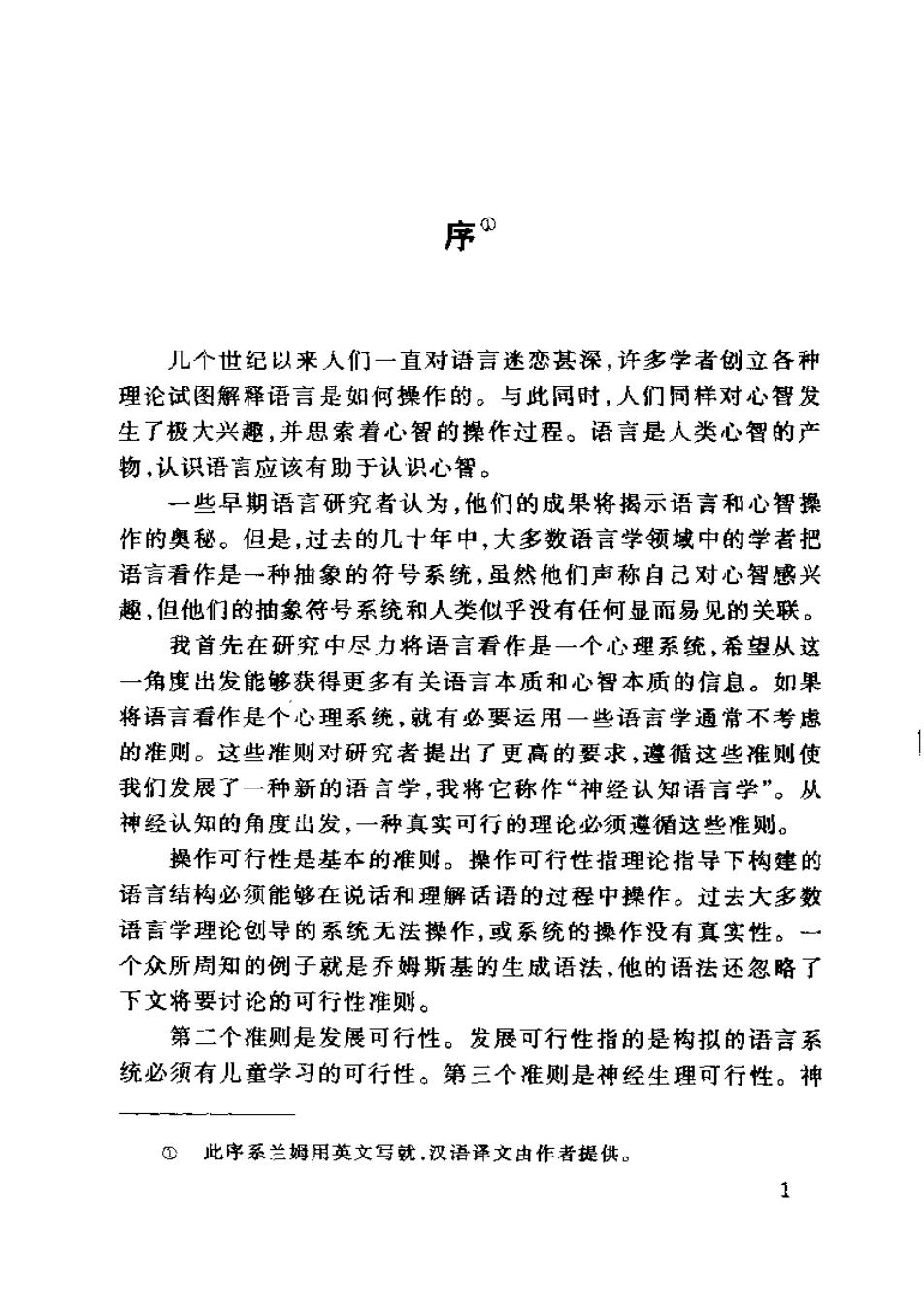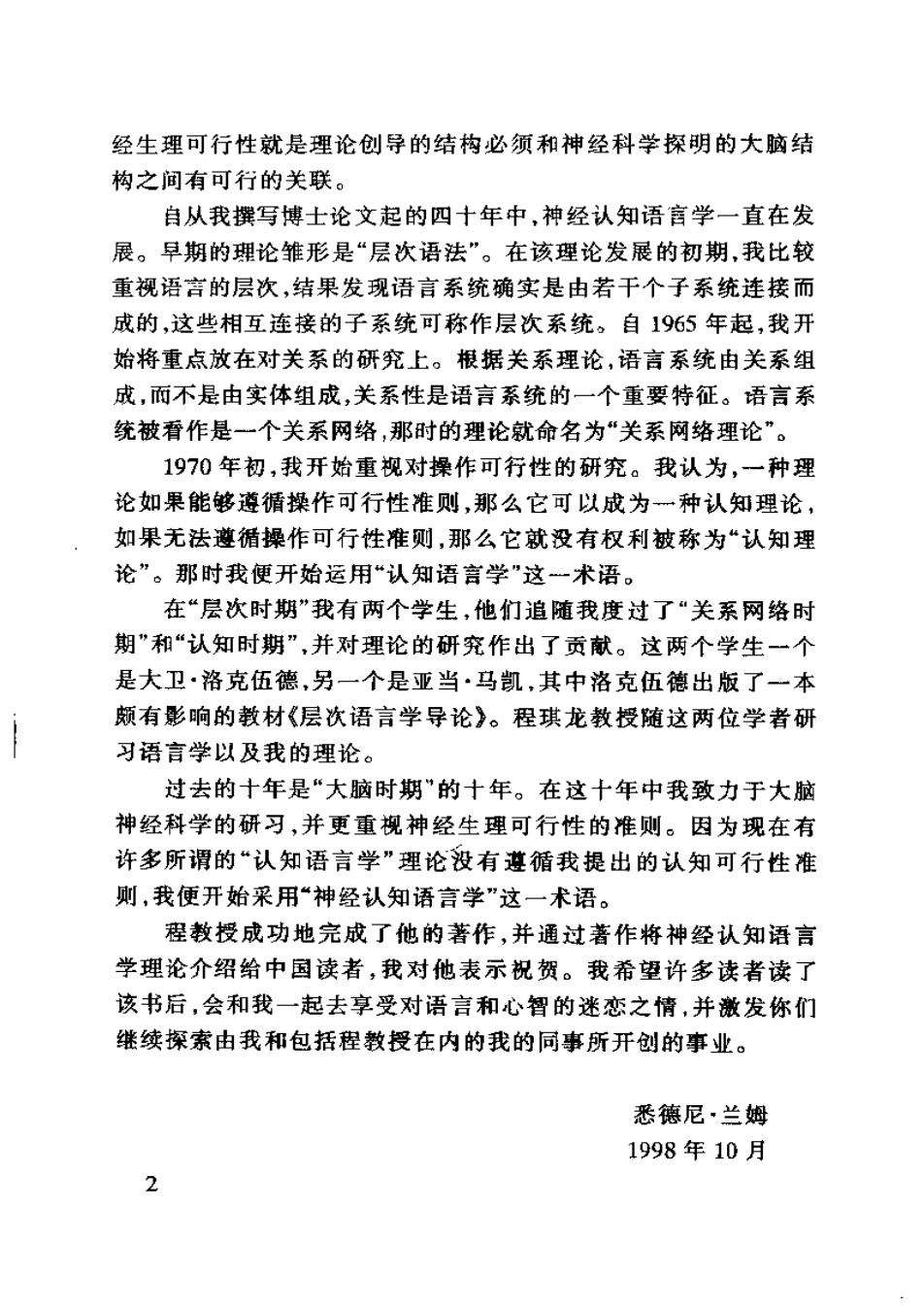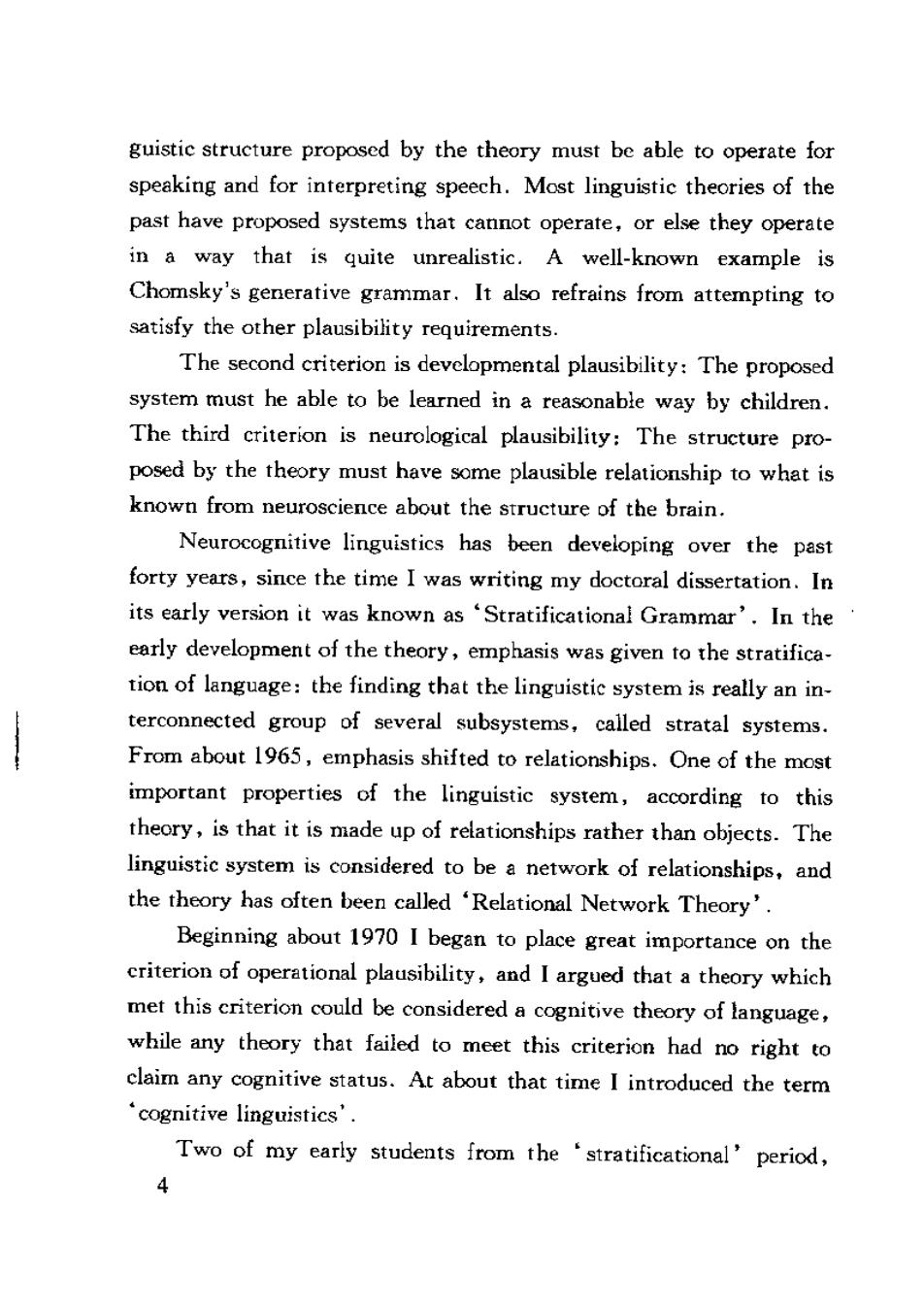
作者简介:程琪龙,1952年生于上海,祖籍浙江奉化。先后获国家 教育部、美国United Board、香港李嘉诚基金会等奖学金多项,并赴 美国、香港研习语言学理论,获语言学专业的硕上、博士学位。现 为上海理工大学英语教授、研究生导师,兼中国高校功能语法教学 研究会常务理事、汕头市外文协会会长。语言学研究涉及当代西 方语言学理论流派,主攻认知、功能理论、理论模式及其计算。曾 发表理论语言学论文近五十篇,专著一部。 5

序0 几个世纪以来人们一直对语言迷恋甚深,许多学者创立各种 理论试图解释语言是如何操作的。与此同时,人们同样对心智发 生了极大兴趣,并思索着心智的操作过程。语言是人类心智的产 物,认识语言应该有助于认识心餐。 一些早期语言研究者认为,他们的成果将揭示语言和心智操 作的奥秘。但是,过去的几十年中,大多数语言学领域中的学者把 语言看作是一种抽象的符号系统,虽然他们声称自己对心智感兴 趣,但他们的抽象符号系统和人类似乎没有任何显而易见的关联。 我首先在研究中尽力将语言看作是一个心理系统,希望从这 一角度出发能够获得更多有关语言本质和心智本质的信息。如果 将语言看作是个心理系统,就有必要运用一些语言学通常不考虑 的准则。这些准则对研究者提出了更高的要求,遵循这些准则使 我们发展了一种新的语言学,我将它称作“神经认知语言学”。从 神经认知的角度出发,一种真实可行的理论必须遵循这些准则。 操作可行性是基本的推则。操作可行性指理论指导下构建的 语言结构必须能够在说话和理解话语的过程中操作。过去大多数 语言学理论创导的系统无法操作,或系统的操作没有真实性。一· 个众所周知的例子就是乔姆斯基的生成语法,他的语法还忽略了 下文将要讨论的可行性准则。 第二个推则是发展可行性。发展可行性指的是构拟的语言系 统必须有儿童学习的可行性。第三个准则是神经生理可行性。神 ①此序系兰姆用英文写就,汉语译文由作者提供。 1

经生理可行性就是理论创导的结构必须和神经科学探明的大脑结 构之间有可行的关联。 自从我撰写博士论文起的四十年中,神经认知语言学一直在发 展。早期的理论雏形是“层次语法”。在该理论发展的初期,我比较 重视语言的层次,结果发现语言系统确实是由若干个子系统连接而 成的,这些相互连接的子系统可称作层次系统。自1965年起,我开 始将重点放在对关系的研究上。根据关系理论,语言系统由关系组 成,而不是由实体组成,关系性是语言系统的一个重要特征。语言系 统被看作是一个关系网络,那时的理论就命名为“关系网络理论”。 1970年初,我开始重视对操作可行性的研究。我认为,一种理 论如果能够遵循操作可行性准则,那么它可以成为一种认知理论, 如果无法遵循操作可行性准则,那么它就没有权利被称为“认知理 论”。那时我便开始运用“认知语言学”这一米语。 在“层次时期”我有两个学生,他们追随我度过了“关系网络时 期”和“认知时期”,并对理论的研究作出了贡献。这两个学生一个 是大卫·洛克伍德,另一个是亚当·马凯,其中洛克伍德出版了一本 频有影响的教材《层次语言学导论》。程琪龙教授随这两位学者研 习语言学以及我的理论。 过去的十年是“大脑时期”的十年。在这十年中我致力于大脑 神经科学的研习,并更重视神经生理可行性的准则。因为现在有 许多所谓的“认知语言学”理论没有遵循我提出的认知可行性准 则,我便开始采用“神经认知语言学”这一术语。 程教授成功地完成了他的著作,并通过著作将神经认知语言 学理论介绍给中国读者,我对他表示祝贺。我希望许多读者读了 该书后,会和我一起去享受对语言和心智的迷恋之情,并激发你们 继续探索由我和包括程教授在内的我的同事所开创的事业。 悉德尼·兰姆 1998年10月 2

Foreward For centuries people have been fascinated by language,and vari- ous scholars have devised theories that attempt to explain how lan- guage works.For just as long,people have been fascinated by the mind and have wondered how it does all the things it does.As lan- guage is a product of the human mind,an understanding of one should help to understand the other. Some early investigators of language believed that their work would shed light on the workings of both language and the mind.But during the past several decades most of the scholars in the field of lin- guistics have treated language as an abstract symbol system without any apparent relationship to actual human beings,even while some of them have professed an interest in the mind. In my research I have tried to understand language as first and foremost a mental system,in the hope of learning more about the na- ture of language as well as the nature of the mind.In order to treat language as a mental system it is necessary to apply certain criteria that are not normally considered in linguistics.These added require- ments make greater demands on the investigator,and with their use we develop a new kind of linguistics,wbich I call 'neurocognitive linguistics'.These criteria are requirements that a theory must meet in order to be considered realistic from a neurocognitive point of view. The basic criterion is that of operational plausibility:The lin- 3

guistic structure proposed by the theory must be able to operate for speaking and for interpreting speech.Most linguistic theories of the past have proposed systems that cannot operate,or else they operate in a way that is quite unrealistic.A well-known example is Chomsky's generative grammar.It also refrains from attempting to satisfy the other plausibility requirements. The second criterion is developmental plausibility:The proposed system must he able to be learned in a reasonable way by children. The third criterion is neurological plausibility:The structure pro- posed by the theory must have some plausible relationship to what is known from neuroscience about the structure of the brain. Neurocognitive linguistics has been developing over the past forty years,since the time I was writing my doctoral dissertation.In its early version it was known as 'Stratificational Grammar'.In the early development of the theory,emphasis was given to the stratifica- tion of language:the finding that the linguistic system is really an in- terconnected group of several subsystems,called stratal systems. From about 1965,emphasis shifted to relationships.One of the most important properties of the linguistic system,according to this theory,is that it is made up of relationships rather than objects.The linguistic system is considered to be a network of relationships,and the theory has often been called 'Relational Network Theory'. Beginning about 1970 I began to place great importance on the criterion of operational plausibility,and I argued that a theory which met this criterion could be considered a cognitive theory of language, while any theory that failed to meet this criterion had no right to claim any cognitive status.At about that time I introduced the term cognitive linguistics'. Two of my early students from the 'stratificational'period, 4